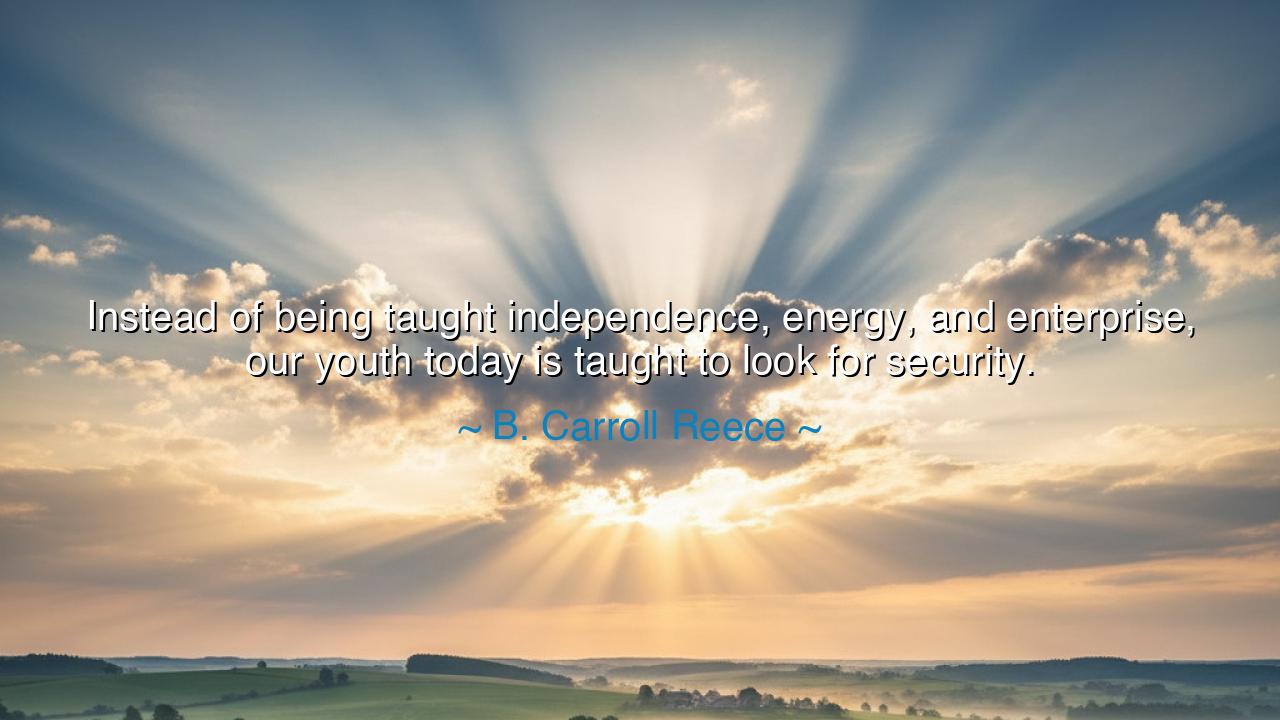
Instead of being taught independence, energy, and enterprise, our
Instead of being taught independence, energy, and enterprise, our youth today is taught to look for security.






The words of B. Carroll Reece resound like a trumpet of warning across the generations. When he said, “Instead of being taught independence, energy, and enterprise, our youth today is taught to look for security,” he spoke not only of his own time but of an enduring human struggle—the battle between freedom and comfort, between the courage to create and the fear of loss. His words strike at the heart of civilization itself, for when a people forget how to stand on their own, when they trade boldness for safety, the spirit of progress withers. To the ancients, this would be the warning of a sage: that the soul of a nation is not preserved by its comforts, but by the strength of its sons and daughters to rise beyond them.
To understand the origin of this quote, one must first understand the man who spoke it. B. Carroll Reece was a statesman, soldier, and representative from Tennessee, who lived through the turbulence of the early 20th century—the Great Depression, two World Wars, and the dawn of the Cold War. He saw firsthand how hardship forged character, and how prosperity, if misused, could dull it. His generation had built, fought, and rebuilt; yet as peace returned, he saw a troubling transformation. Youth, instead of inheriting the fiery virtues of self-reliance and enterprise, began to be trained to seek security—to find comfort in systems, safety in dependence, and stability in conformity. Reece’s words were both lament and prophecy: a warning that comfort, when idolized, becomes the slow death of courage.
He spoke of independence, not as isolation, but as strength—the inner power that allows a person to stand firm, to face the storms of life without fear. He spoke of energy, the boundless vigor of youth, the restless force that drives innovation, exploration, and creation. He spoke of enterprise, the daring spirit that turns dreams into deeds, that refuses to accept the world as it is and strives to make it better. These were once the virtues upon which nations were built. But Reece saw them being replaced by a dangerous yearning for security—a desire for protection that can, if left unchecked, enslave the very people it seeks to shield. For when comfort becomes the highest goal, freedom becomes too costly a price to pay.
History gives us many examples of this truth. Consider the ancient Romans, who in their prime were fierce, industrious, and self-reliant. They conquered not out of greed, but from the restless energy of a people who believed in their destiny. Yet, as generations passed, wealth replaced virtue, and comfort replaced courage. The citizens who once tilled the land and fought their own battles began to rely on slaves and mercenaries. They sought not greatness, but ease. Bread and circuses became their gods, and the empire that had once ruled the world fell not from invasion, but from apathy. So too, Reece warned, might any nation perish—not by the sword, but by its own softness.
Yet his words are not only a condemnation; they are a call to awakening. To teach independence is to plant the seed of resilience in the soul. To teach energy is to ignite the fire of purpose that no adversity can extinguish. To teach enterprise is to give birth to innovators, leaders, and creators—the builders of tomorrow. But to teach only security is to smother the flame of ambition, to raise a generation that seeks shelter rather than challenge, and who, in avoiding risk, avoids greatness. Reece understood that nations are only as strong as the character of their youth, and that a people who fear struggle will never know triumph.
There is a story from the early days of America that embodies Reece’s wisdom. During the harsh winter at Valley Forge, General George Washington and his soldiers endured bitter cold, starvation, and despair. Many were barefoot, their feet leaving trails of blood in the snow. Yet it was in that crucible of suffering that a nation was forged. Those men, unprotected and uncertain, could have chosen security—they could have surrendered or sought comfort in retreat. But instead, they chose independence, energy, and enterprise. They believed that freedom, though perilous, was worth any cost. From their endurance came a new world—a world that would later forget, as Reece warned, the price of its own liberty.
And so, the lesson of this quote is as vital today as when it was first spoken: that comfort must never become a substitute for courage. Security has its place—it guards the weak and protects the innocent—but it must never enslave the strong or dull the will of the free. Each generation must be taught again that independence is not granted, but earned; that energy is not to be contained, but directed; and that enterprise is the sacred duty of those who inherit freedom.
The practical path is this: seek challenge over comfort, purpose over ease, and principle over safety. Teach the young not merely how to survive, but how to strive. Let them fail, so they may learn to rise. Let them question, so they may learn to think. For as B. Carroll Reece reminds us, a secure people without independence are already in chains, while a free people—even in hardship—carry the promise of greatness. Independence is the root from which all human flourishing grows; guard it, nurture it, and pass it on, lest the flame of liberty go dark in the hearts of those yet to come.






AAdministratorAdministrator
Welcome, honored guests. Please leave a comment, we will respond soon